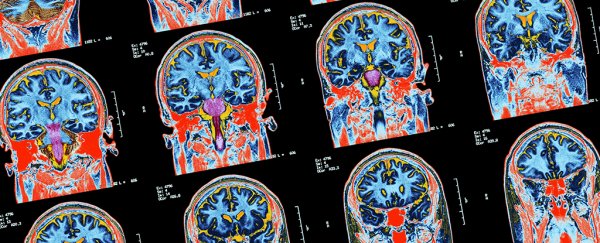Scientists have been able to observe brain activity linked with obsessive-compulsive disorder (OCD) in more detail than ever before – and if these neural signals can be identified, it opens up the possibility of being able to change them as well.
OCD can affect up to two in every 100 adults, and while various behavioral treatments and drugs are available, it's estimated that 25-40 percent of those with OCD don't get any sustained benefits from them. The disorder can involve intrusive thoughts and compulsive behavior, affecting daily life and causing distress.
In this latest study, five volunteers with severe OCD were monitored both in the lab and at home during daily life, with the collected data including measurements of brain activity as well as facial expressions, body movements, heart rate, and self-reported OCD symptom intensity.
This suite of information gathered in real time enabled the researchers to spot associations between behavioral activity and signals in the brain. While the sample size for the experiment was only a small one – and follow-up studies will be required – it potentially points the way towards a new field of treatment.
"This is the first time brain signals from participants with neuropsychiatric illness have been recorded chronically at home alongside relevant behavioral measures," says biomedical engineer Nicole Provenza from Brown University in Rhode Island.
"Using these brain signals, we may be able to differentiate between when someone is experiencing OCD symptoms, and when they are not, and this technique made it possible to record this diversity of behavior and brain activity."
The devices used to chart brain activity can also provide brain simulation: known as deep brain stimulation or DBS devices, they use planted electrodes to trigger certain patterns of electrical stimulation in the brain. DBS has shown some promise as a way of treating OCD, especially in people who haven't responded to other measures.
However, there are limitations to DBS, in that it can't be easily or quickly adapted as symptoms change – currently they only provide a constant level of stimulation that can be adjusted by doctors. Part of the thinking behind this new study was to work towards an adaptive DBS system that could be even more effective.
Eventually, the aim is to create adaptive DBS devices that can modify the electrical pulses they give out in response to biomarkers, without any need for patients to keep visiting a doctor. If the treatment was only being applied when symptoms were at their worst, that would potentially limit side effects like headaches and difficulty concentrating.
"OCD is a disorder in which symptom severity is highly variable over time and can be elicited by triggers in the environment," says biomedical engineer David Borton from Brown University.
"A DBS system that can adjust stimulation intensity in response to symptoms may provide more relief and fewer side effects for patients. But in order to enable that technology, we must first identify the biomarkers in the brain associated with OCD symptoms, and that is what we are working to do in this study."
While the team was able to identify brain patterns potentially linked to OCD in what's known as the cortico-striatal-thalamo-cortical loop, we're still at the early stages – it's not yet clear what these signals might mean or how they might be manipulated, but we do now know that this is an idea worth investigating.
Future research would need more participants and more information collected over a longer period of time, say the researchers – daily exercise would be a useful data point that wasn't included in this particular study, for example.
OCD is a complex disorder that affects different people in a lot of different ways, which is why a personalized approach to treatment could be the best way forward. Studies like this could also reveal how OCD takes control of the brain as well as suggesting how the effects of the disorder could be alleviated.
"Our goal is to understand what those brain recordings are telling us and to train the device to recognize certain patterns associated with specific symptoms," says neuroscientist Sameer Sheth from Baylor College of Medicine in Texas.
"The better we understand the neural signatures of health and disease, the greater our chances of using DBS to successfully treat challenging brain disorders like OCD."
The research has been published in Nature Medicine.
